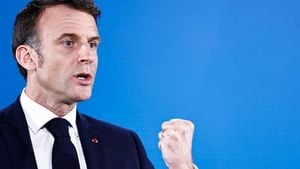Elon Musk, the tech mogul known for his ventures like SpaceX and Tesla, is currently at the center of controversy following his appointment to lead the “Department of Government Efficiency” under Donald Trump’s administration. This role could see him wielding significant influence over federal spending and regulation—a power some experts warn could lead to ethical conflicts based on Musk's existing business dealings.
The backdrop to Musk's appointment is steeped in geopolitical concerns, particularly around his alleged communications with Russian President Vladimir Putin. Reports indicate Musk has maintained channels of communication with Putin since late 2022, leading two senior Democratic senators to request a federal investigation. They argue this relationship poses potential risks to Musk’s reliability as a government contractor, especially since SpaceX holds lucrative contracts with the U.S. Department of Defense and other federal agencies.
Senators Jack Reed and Jeanne Shaheen sent a letter to the Department of Justice and the Pentagon expressing their worries about the validity of Musk’s clearances as he engages with foreign leaders. They emphasized how any unauthorized contact with high-security figures like Putin could threaten national security, particularly within the current climate of rising tensions between the U.S. and Russia.
Significantly, their letter pointed out how communications between individuals with high-security clearance and foreign officials are rigorously monitored—suggesting any slip could have severe consequences. Musk's technology, particularly the Starlink satellite communication system, is integral to U.S. defense operations, making these revelations even more alarming for security officials.
This scrutiny follows earlier exposés by The Wall Street Journal which detailed discussions between Musk and Russian officials, including interactions surrounding Musk's Starlink services’ role during the conflict involving Ukraine. Such high-level discussions prompted the call for investigation, as senators worry these could lead to sensitive intelligence leaks.
The concerns are amplified by recent actions from Russian intelligence, where the DOJ seized domains tied to Russian efforts to exploit U.S. cybersecurity. Senators Reed and Shaheen argue this environment of increased espionage from Russia necessitates thorough oversight of Musk’s communications.
Adding to this complicated web of interests is Musk's rapid ascent within the Trump administration. Besides his technological contributions, Musk’s loyalty to Trump was solidified during election campaigns, where he openly supported the former president and touted plans to overhaul bureaucratic inefficiencies.
Musk’s new role allows him to operate somewhat outside the direct constraints of government agencies, potentially sidestepping any legal limitations tied to conflicts of interest with his businesses. Upon taking charge, he is set to advocate for reductions across the $6.8 trillion federal budget, with claims he could save at least $2 trillion—a proposal eagerly welcomed by Trump.
This bid to cut federal regulations and streamline government operations aligns closely with the administration's push for reduced oversight—a move critics argue dismisses the importance of regulated safety protocols and ethical standards.
Experts caution about the dangers of appointing someone like Musk, who has previously shown little regard for safety when making decisions at major tech companies. His rapid influence on Twitter, for example, led to mass layoffs and drastic shifts in content moderation policies—changes some claimed transformed the platform’s culture negatively.
It's also worth noting how Musk’s prominent role could reshape public trust; ethical conflicts arising from personal connections with foreign leaders could provoke skepticism among regulators and the general public. This is particularly pertinent as Musk continues to push for more invasive government reform.
Until now, Musk has been seen not just as another entrepreneur but as one of the most disruptive forces reshaping technology and government relations. His influence has irrefutably expanded, infusing traditional bureaucratic processes with Silicon Valley’s audacious, if sometimes reckless, spirit. The future will determine whether Musk’s engagement with Trump and other international leaders serves the interests of the public or merely furthers private ambitions.



